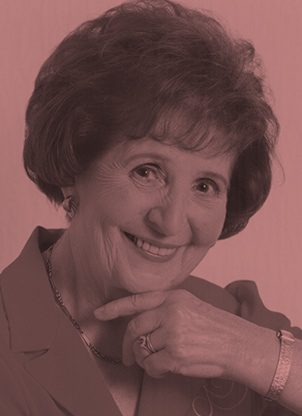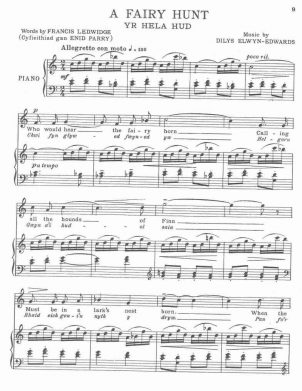Wherever Welsh song is performed, it is likely that the songs of Dilys Elwyn-Edwards will be amongst them. When she died in January 2012, she had become one of the best-known and most highly regarded of all living Welsh song composers. Much of her life was spent in Caernarfon, overlooking the Menai Straits, where she produced a small yet elegant output almost entirely in the field of song, many of which have become classics of the Welsh song repertoire.
As a girl she studied at Dr Williams’s School for Girls in Dolgellau before taking a music degree at University College of South Wales and Monmouthshire (later Cardiff University). Here she encountered many of the composers whose music would form a bedrock for her own individual style: Vaughan Williams, Delius, Warlock, Moeran and, crucially, Herbert Howells, with whom she went on to study at the Royal College of Music after the Second World War.
Apart from a brief spell in Oxford, where her husband, Elwyn Edwards, was a Presbyterian ordinand at Mansfield College, the rest of her life was spent in Caernarfon where she worked as a piano tutor at Bangor University.
Much of her output dates from the 1950s onwards where she found her natural voice as a miniaturist in the form of the art song. Her later songs tended to concentrate on Welsh poetry, leading to some of the classics of that genre in songs such as the 1962 Caneuon y Tri Aderyn (Songs of Three Birds). In later years she also wrote choral music and found her songs being taken up by a new generation of Welsh singers such as Bryn Terfel, Rebecca Evans, Jeremy Huw Williams, Helen Field and Shân Cothi. The death of her husband in 2005 brought her creativity to a natural close, but the songs themselves, if anything, seem to grow in popularity amongst singers every year.
A new CD, recorded by soprano, Elin Manahan Thomas and pianist, Jocelyn Freeman is availble from Tŷ Cerdd Records:

(i) Y Gylfinir (The Curlew)
(ii) Y Tylluanod (The Owls)
(iii) Mae Hiraeth yn y Mor (There is Hiraeth in the Sea)
This collection of three songs was commissioned by the BBC in Wales in the early 1960s. The composer was by then settled in Caernarfon where she also taught at the local grammar school. Her husband David Elwyn Edwards was minister of Castle Square Presbyterian Church in the town and throughout Dilys’s creative life he advised her closely on the choice of texts for her works. For this cycle they settled on the poems of R. Williams Parry and the first two came reasonably easily. It was their friend the dramatist Dr. John Gwilym Jones who pressed Dilys to set the great sonnet ‘Mae Hiraeth yn y Mor’ and she was initially reluctant precisely because it was a sonnet. Even after completing it she felt uncertain – but was determined, nevertheless, that it would start with a phrase leading to a high A-flat! The BBC was initially dubious about this so the composer rang her friend William Mathias, who was a Lecturer at nearby Bangor University. He immediately suggested the tenor Kenneth Bowen: “Ken has a wonderful top A flat” he said – and so one of the most memorable openings to any Welsh song went ahead unaltered. It soon established itself as a concert and competition favourite for both tenor and soprano voices and is now a classic of the repertoire.
Buy the score from Gwynn:
(i) A Piper
(ii) The Night
(iii) Two Pewits
Although many of her songs and choral works were published during her lifetime, Dilys Elwyn-Edwards kept quite a stock of music hidden away. The reasons were varied – sometimes she would be unhappy with certain works as performed and therefore be reluctant to release them without revision or rewriting. Other compositions might be for less than marketable forces and so publishers themselves were reluctant. In this instance these three songs for soprano, clarinet and piano come into the latter category. During her years with Herbert Howells at the Royal College of Music Dilys set much English poetry with great insight and natural fluency and these three examples show her at her best.
Originally commissioned and performed in 1978 by Academi St Teilo (Mair Cooper – Soprano; Alun Cooper – Clarinet; Gerald Jones – Piano). You can listen below to a performance given at the launch of Discover Welsh Music (at the National Library in Aberystwyth in December 2015) by soprano Meinir Wyn Roberts, clarinettist Carwyn Thomas, and pianist Sioned Evans.
Y Glomen (The Dove)
Y Deryn Du (The Black Bird)
Y Glomen and Y Deryn Du are two of many unpublished folk-song arrangements and are a reminder that Dilys was herself possessed of a pleasant singing voice. She often sketched accompaniments for her own enjoyment as well as for concerts and broadcasts when she frequently appeared as a fine piano accompanist for singers.
(i) When Music Sounds
(ii) Epitaph
Walter de la Mare was unquestionably one of Dilys Elwyn-Edwards’s favourite poets – a predilection instigated by an initial love of Herbert Howells’s incomparable song King David and other settings of his of poems from Peacock Pie. During her studies with Howells in the early 1950s he often encouraged her to set poems by some of his own favourite writers and one notable example was the beautiful part-song,All that’s Past, which was published then by Novello and included as a supplement in Musical Times. Following her return to Wales in the late 1950s it was probably inevitable that she set Welsh poetry (rather than English) in that Dilys responded most naturally to requests or commissions for music and wrote comparatively little without such stimulus. So when, in 2001, she was commissioned to write some songs for the Criccieth Festival to be sung by the soprano Rosamund Shelley it was characteristic that she turned to de la Mare for these two beautifully fashioned, reflective songs. It was revealing however, after her death, to find – as her musical executor – that she had in fact set An Epitaph many years previously, with no performance in mind but just for her private pleasure. At the time of the Criccieth concert she had made no mention of this fact and it was poignant to find – retrospectively – that the later setting was markedly different in tone. A meditation on the passing of time and the fading of beauty was somehow the perfect song to act as an unconscious swansong itself.
Buy the score from Gwynn:
